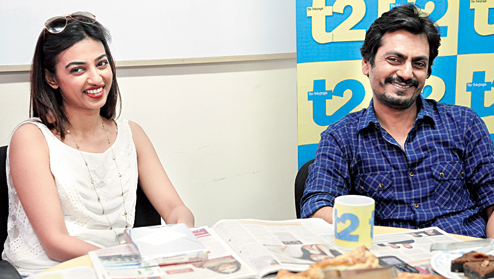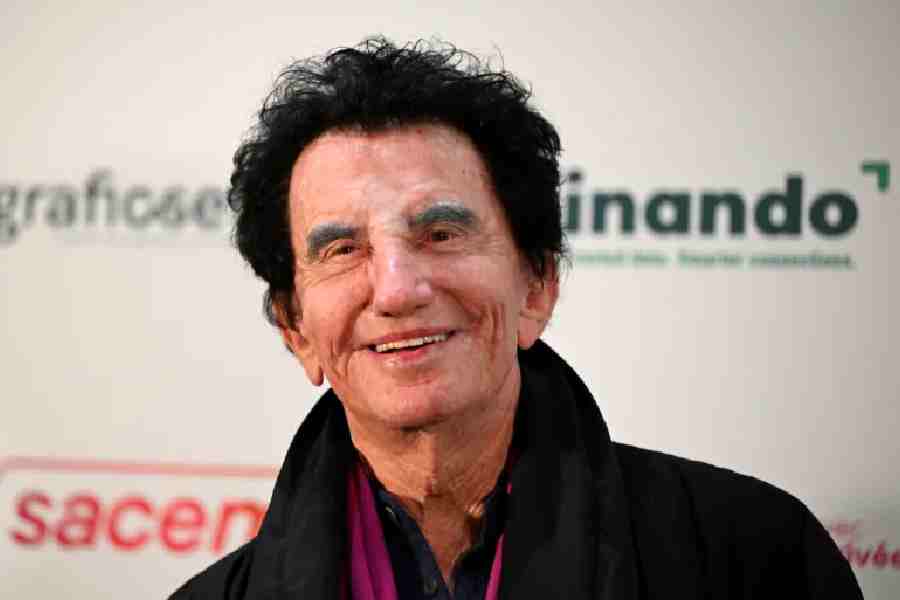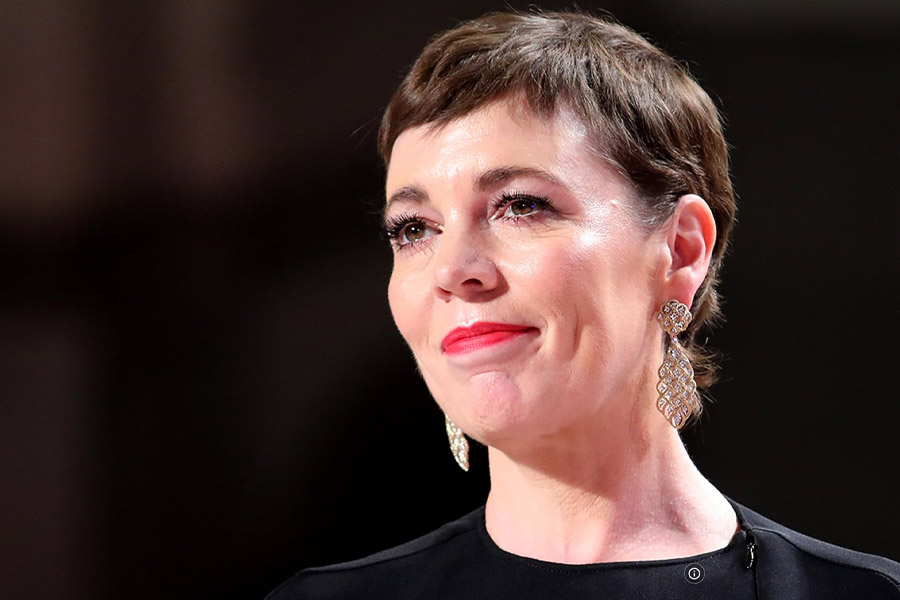
The t2 office had three special guests on Monday afternoon — Nawazuddin Siddiqui and Radhika Apte walked in with their Manjhi: The Mountain Man director Ketan Mehta to talk about their August 21 biopic that tells the inspiring story of Dashrath Manjhi (played by Nawaz) who tirelessly chipped away at a mountain for 22 years to carve out a road after he lost his wife Phaguniya (played by Radhika) when he couldn’t get her medical help on time. Popping in for a short chat, the trio spoke about Calcutta and what Manjhi the film means to them.
Priyanka Roy (Team t2): You’ve been travelling the country promoting this film. What’s the response been like?
Radhika Apte: Actually, it’s been very, very positive. We’ve been going to every city and felicitating people there, like their (Dashrath) Manjhis… people who have done some extraordinary work. It makes us feel very small, trust me. When you have a small film, then you really have to promote it, especially because the big films really eat into the small films.
Priyanka: Nawaz, you wrote on your Facebook page today that you experienced your ‘prothom success’ in Calcutta (with Kahaani). Radhika, you started your career here with Antaheen (directed by Aniruddha Roy Chowdhury and co-starring Rahul Bose). How does it feel to come back and how would you summarise working here?
Radhika: I love Calcutta... I really do. For Antaheen, I stayed here for two-and-a-half months and made this whole new bunch of friends. I have walked the streets from north to south. I’ve literally done all those things you need to do when you come to Calcutta... eaten all kinds of food. I think the way you guys have accepted me from being non-Bengali to a Bengali is very humbling. And I am hopeful of doing another Bengali film. Let’s see.
Nawazuddin Siddiqui: I have come back a number of times. And I have done many shoots for films here as well, so it feels like second home to me. It started with Kahaani and when we did the whole shoot of (Buddhadeb Dasgupta’s) Anwar Ka Ajab Kissa here and then there were a couple of more projects… so I have been coming and going. My first success was Kahaani (directed by Sujoy Ghosh). It was the first film that gave me a lot. It all began here and I always remember that.
Chandreyee Chatterjee (Team t2): What was it about the role of Dashrath Manjhi that made you want to do it?
Nawaz: See, everything that an actor is hungry for is there in this role. There was an intensity and at the same time, there was humour in it and the passion and romance this man had. There are these four or five elements and if you get it all in any one character, then what can be better than that?
Chandreyee: Radhika, what drew you to the film?
Radhika: Right at the beginning, I didn’t know about the film, it was just Ketan Mehta directing it. I was staying in Pune at that time, three years ago. I ran to Bombay to do the audition. So he was the first reason. And then the film, of course, has a really great love story and I wanted to be a part of that. And then I got to know that Nawaz was playing the lead, so it all worked out for me.
Malancha Dasgupta (Team t2): The film deals with a pretty serious subject, but did you do anything fun on set or after the shoot?
Nawaz: There are a lot of funny parts to the film also. It’s a mixture. It’s about life. It’s a biopic and a man’s life can’t be only serious... it can’t be only one-dimensional (laughs). So it had all those elements. We had a great time shooting.
Chandreyee: Did shooting where the story is based (Gehlaur village in Bihar) add to the film?
Radhika: (Looking at Nawaz): Again you’re looking at me, is it? Okay! (Laughs) Of course it added to the film. Imagine if you were shooting in Bombay in a studio in some small hill... it wouldn’t be the same at all. We literally became speechless because this huge mountain is unbelievable. There is extreme poverty in the village and there are only women and children because the men are outside working. Yes, it was very hectic. We used to wake up every morning at 3- 3.30 and travel an hour-and-a-half and start the shoot at 6am because it was winter and the days were smaller. So ya, it was hectic but hectic means it is memorable, right? So it was fun.
Priyanka: Nawaz, you have said in an interview that Radhika was chosen because it should feel like you could really break a mountain for this woman. (To Radhika) That must have made you feel very good, right?
Radhika: He is just pulling my leg!
Priyanka: We are sure he was being serious!
Nawaz: Really, we needed such a face (smiles).
Priyanka: You had told t2 after Kahaani that you had been offered 125-150 scripts and out of that you chose Manjhi. Why?
Nawaz: I think when you see the film, you’ll get the idea. It is such a mature character and I think I am fortunate that I am getting such performance-oriented characters to play. And then there is Ketan Sir who, as Radhika was saying, is no doubt a legendary director of this country. From the very beginning, when he made Bhavni Bhavai (1980) and Mirch Masala (1987), I have wanted to work with him.
Ankush Goutam Ghosh (third year, Jadavpur University student): There is a forward on Facebook that says no one is stupid enough to spend Rs 300 to watch the acting of one person, unless it is Nawazuddin Siddiqui. How does it feel that you are seen as the actor in Rs 300-crore blockbuster films?
Nawaz: We’ll find out this time with my solo film whether people are really coming to see me. If people come to see the film, then I’ll really know that I have a fan following. Sometimes, I don’t believe it.... You are right, but my exam is now if you actually see it. We will know if what people are saying is actually true, or if it’s all in the air! (Laughs)
(Ketan Mehta joins the chat)
Priyanka: Ketan Sir, why did you choose Radhika and Nawaz for their respective roles?
Ketan Mehta: They are the finest actors of their generation… no questions about that. They are extremely committed and with great amount of self-belief they have carved out their own path in the film industry just on the basis of their talent. I cast according to the script and they fitted their roles perfectly.
Chandreyee: What does Manjhi: The Mountain Man mean to you and why was it so important to make this film?
Ketan: As you know, Manjhi… is based on a real-life story… it’s about the poorest of the poor man from the lowest of the low caste, coming from one of the most backward regions of India. It’s the story of a man who actually broke a mountain for love for 22 years of his life with just a hammer and a chisel. Now, don’t you think it’s an amazing story to tell? I haven’t read a more inspiring story in my life. The moment I read about this man, the decision was immediate that this is a story that has to be told and shared with as many people as possible. Because in India today, what is the youth looking for, really? It’s looking for some inspiration. For me, Manjhi’s story is about making the impossible possible.
Chandreyee: Why did you decide to shoot the film where Dashrath Manjhi spent his whole life?
Ketan: Well, we went to do research in this village called Gehlaur in the Gaya district of Bihar. When you go and see this mountain and the rocky path that’s carved out of it, you are filled with awe. We realised that the mountain is as important a character as Dashrath or Phaguniya. That’s when we decided to shoot right there, despite all the difficulties. This was the most difficult shoot of my life, for sure. Most challenging, most difficult… yet at the same time, most fulfilling and most enriching shooting experience.
The real joy was that Dashrath Manjhi’s whole family participated in the making. In some sequences, the whole village participated in the shoot.
Aishani Laha (second year, English honours, St. Xavier’s College): Radhika, you have worked in so many regional films — Tamil to Telugu, Bengali to Marathi. How do you manage to straddle so many industries?
Radhika: I think it’s so exciting to go and see different cultures and know more about them… know more about the cities, the people, their likings, their stories… I enjoy doing that.
Aishani: Adapting to the various languages must be a problem?
Radhika: It is a problem… especially if the shoot is over two weeks, I go a little mad with so many people talking a language I don’t understand! (Laughs) Bengali is a language I could speak really well, but now it’s been four-five years and I don’t know it so well anymore.
Priyanka: Can you say a few words in all the languages you have worked in?
Radhika: Not all, but aami Bangla ektu ektu bolte pari (smiles). I remember my first dialogue from my first film (Antaheen), but anyway…
Priyanka: Which was?
Radhika: No, no… (points towards Ketan) let’s talk about Manjhi (laughs).
Malancha: Come August 21, what is it that you want people to take back from Manjhi?
Radhika: (looks at Ketan): Inspiration?
Ketan: Love and passion.
Nawaz: Agar aapka junoon hai kisi cheez ko leke, tab aap kuch bhi kar sakte hain.
Priyanka: Which is the story of your life, right?
Nawaz: Haan, bilkul (smiles).
Priyanka: Ketan Sir, does the Bollywood of the future rest on the shoulders of performers like Nawaz and Radhika?
Ketan: They are already stars. They are actually a new breed of stars in this industry… they are actor-stars and not star-actors. And that’s really good for Indian cinema.
Are Nawaz and Radhika the best actor-stars in Bollywood? Tell t2@abp.in
Pictures: Pabitra Das and B. Halder











